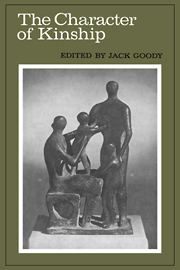Book contents
- Frontmatter
- Contents
- Dedication
- Introduction
- KINSHIP AND DESCENT
- Descent and Marriage Reconsidered
- Kinship, Descent and Locality: Some New Guinea Examples
- Descent in New Guinea: an Africanist View
- Complementary Filiation and Bilateral Kinship
- THE NATURE OF KINSHIP
- THE NATURE OF THE FAMILY
- MARRIAGE AND AFFINAL ROLES
- Bibliography of the Writings of Meyer Fortes
- References
- Index
Descent and Marriage Reconsidered
Published online by Cambridge University Press: 07 May 2010
- Frontmatter
- Contents
- Dedication
- Introduction
- KINSHIP AND DESCENT
- Descent and Marriage Reconsidered
- Kinship, Descent and Locality: Some New Guinea Examples
- Descent in New Guinea: an Africanist View
- Complementary Filiation and Bilateral Kinship
- THE NATURE OF KINSHIP
- THE NATURE OF THE FAMILY
- MARRIAGE AND AFFINAL ROLES
- Bibliography of the Writings of Meyer Fortes
- References
- Index
Summary
A reconsideration of some of the themes from the debate on descent and filiation, so prominently shaped by Meyer Fortes over a number of years (Fortes 1953 a, 1959 a. 1969) may serve as a fitting tribute to a teacher and senior colleague. My approach in the following departs from the main trend in this debate in two respects: I give greater attention to how native concepts and social groups are shaped by interaction and experience, rather than how they constitute cognitive schemata; and I introduce some further materials, mainly on Middle Eastern systems, into the discussion. By these means I hope to contribute to the debate on the nature of kinship, descent and filiation, and to shed some light on the properties of the Middle Eastern systems.
The intent of Fortes' central original article (Fortes 1953 a) was by the examination of a variety of new ethnographic materials to formulate a general understanding of the nature of descent and descent groups. These materials were heavily weighted towards certain African societies; and in retrospect we may see that some of the confusion and disagreement which those early generalizations engendered arose from empirical differences in the descent systems of different areas, i.e. from the common anthropological tendency to transform particular ethnographies to a paradigm of Man. This was first made clear by Leach (1957, last two paragraphs), a lead later developed by Schneider.
- Type
- Chapter
- Information
- The Character of Kinship , pp. 3 - 20Publisher: Cambridge University PressPrint publication year: 1974
- 2
- Cited by



